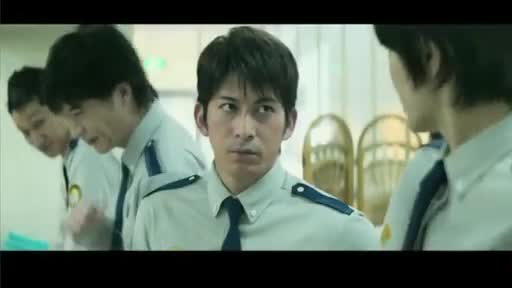Library Wars
aka 図書館戦争 aka Toshokan Senso

2013![]()
Written by Akiko Nogi
Based on the novel by Hiro Arikawa
Directed by Shinsuke Sato

In a near-future, the battle between censorship and free speech has become a literal war, with bullets flying and blood being shed. As a news stories montage in the beginning explains, censorship laws were passed that became more and more expanded (the Media Betterment Act), with a government agency called the Media Betterment Committee set up to enforce the laws. They begin raiding bookstores and burning books, censoring the internet, and the list of forbidden books balloons and balloons. Eventually, local governments form a Library Defense Force to protect libraries, who are able to keep the forbidden books thanks to other laws. Over time, the two sides grow more militarized and come into violent conflict.

This is the world of Library Wars. Just think of Fahrenheit 451, except this time everyone has lots of guns. But it’s more than just a parable about censorship, Library Wars weaves its way through several genres, even becoming a comedic romance! The Library Defense Force is a true defense force. They do not fire first, and they do not shoot to kill. As you can imagine, the Media Betterment Force does not abide by the same rules (though they do manage to not kill anyone on camera in the course of the film, deaths being shown are provided by “unaffiliated groups” that Media Betterment leaders just happen to have on speed dial!)

The opening sequence of a library being shot up by masked goons and then torched sets the stage for the stakes in the brutal censorship battle. Both sides are empowered by the various national and local laws, and follow them to the letter. This leads to absurd situations like the leaders of the two sides meeting to discuss terms and quote passages, then setting the time and length of the battle.


The ridiculous represented in the terms discussions are mirrored by the various objections used by groups to try to acquire (to destroy) objectionable books. A PTA group objects to horror comics, and when a murderer is found to have been a fan of the same comics, that leads to one of the armed battles with the Media Betterment Force.
We follow one of the Library Force’s new recruits, Iku Kasahara (Nana Eikura), who joined the force after being inspired by a mystery member of the Library Force that saved her (and a book she was holding) during a raid on a bookstore. She is the first female recruit in the military wing of the Library Defense Force, though there are women in the administrative section, such as Kasahara’s friend Asako Shibasaki (Chiaki Kuriyama)
Kasahara is given a tough time in basic training by her instructor Atsushi Dojo (Junichi Okada), who doesn’t think she’s good enough to serve, and by recruit superstar Satoshi Tezuka (Sota Fukushi), who spends all his time being awesome and looking down on those who aren’t. Dojo’s antagonism with Kasahara is based on his belief that she doesn’t treat the service as a part of the war it is. Through various hints spoilered early on, Dojo was shown to have been more rash in his youth, and matured through the years of constant fighting with the Media Betterment Force.
Things come to a head when an archivist at a foundation dies, he has in possession a number of papers that expose corrupt manipulations of the Media Betterment Society, who will do anything to keep that information from reaching the public and threatening their power.
The Library Defense Force’s restriction against shooting to kill leaves them with one hand tied behind their back, and most of their operation is retreating wave after wave as they slowly gain casualties. Even the snipers can’t shoot for the head, there is a de-helmeted Media Betterment Force troop who gives the LDF a “you can’t do that!” look through the scope after his headgear is shot off. The defense-only declaration helps give the Library Defense Force the moral authority to continue to exist, the constant battles and fights for the side of freedom, even of disgusting things, is a dance played out a thousand times in schools, libraries, bookstores, and internet sites around the globe.
Most telling is a statement by one of the (few) journalists who cover the fighting, despite a brief media flurry about what horrible things the Media Betterment Society is doing, she knows that in a few days the public will go back to thinking things don’t involve them. The war will continue.


An entertaining tale that covers a lot of ground, Library Wars is easily identified as a work by Shinsuke Sato, as it is an adaption of a long tale that produces a long movie. Sato’s work doesn’t make it boring, the shifts from one tone to another happen smoothly enough that nothing is jarring, and feels a window into that world. The battles do lack a small bit of drama as there is no real bodycount, but characters who do kill and are deadly make appearances to give us the suspense we need. Kasahara grows from a naive but noble child to a mature member of a defense force, while Dojo struggles to balance his youthful exuberance and his older caution to best serve his team.
Library Wars is based on the light novel series by Hiro Arikawa (which has become a manga and anime), and the books go beyond the story presented in the film. Director Shinsuke Sato is hopeful a sequel will be made, though made no promised. I attended the West Coast premiere as part of the Japan Film Festival of San Francisco, complete with Shinsuke Sato there to answer questions. As a media producer, he’s obviously concerned with censorship, and he relished being able to cover a story that spanned action, romance, comedy, and drama.
(Note: I have press access at the JFFSF/J-POP Summit Festival, but paid my own way to the movie screenings. Don’t forget to check out our coverage of Dreams for Sale and the free concert in Union Square featuring Kyary Pamyu Pamyu!)


Rated 8/10 (movie logo, LDF logo, Mr. Perfect, know him by his touch, defender, compound, transport helicopter, movie shield wall)
Please give feedback below!











